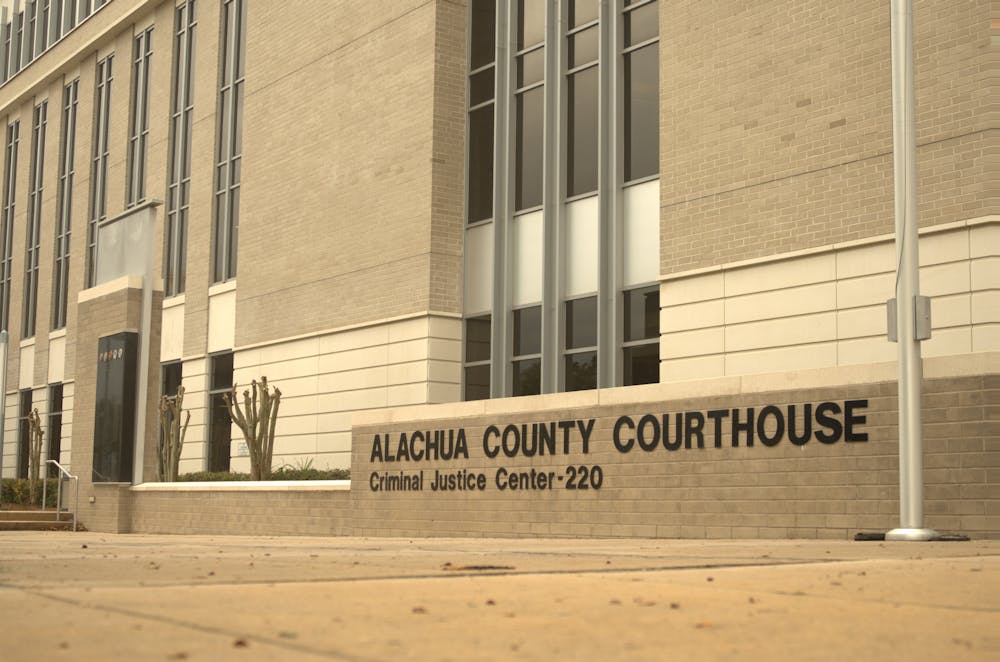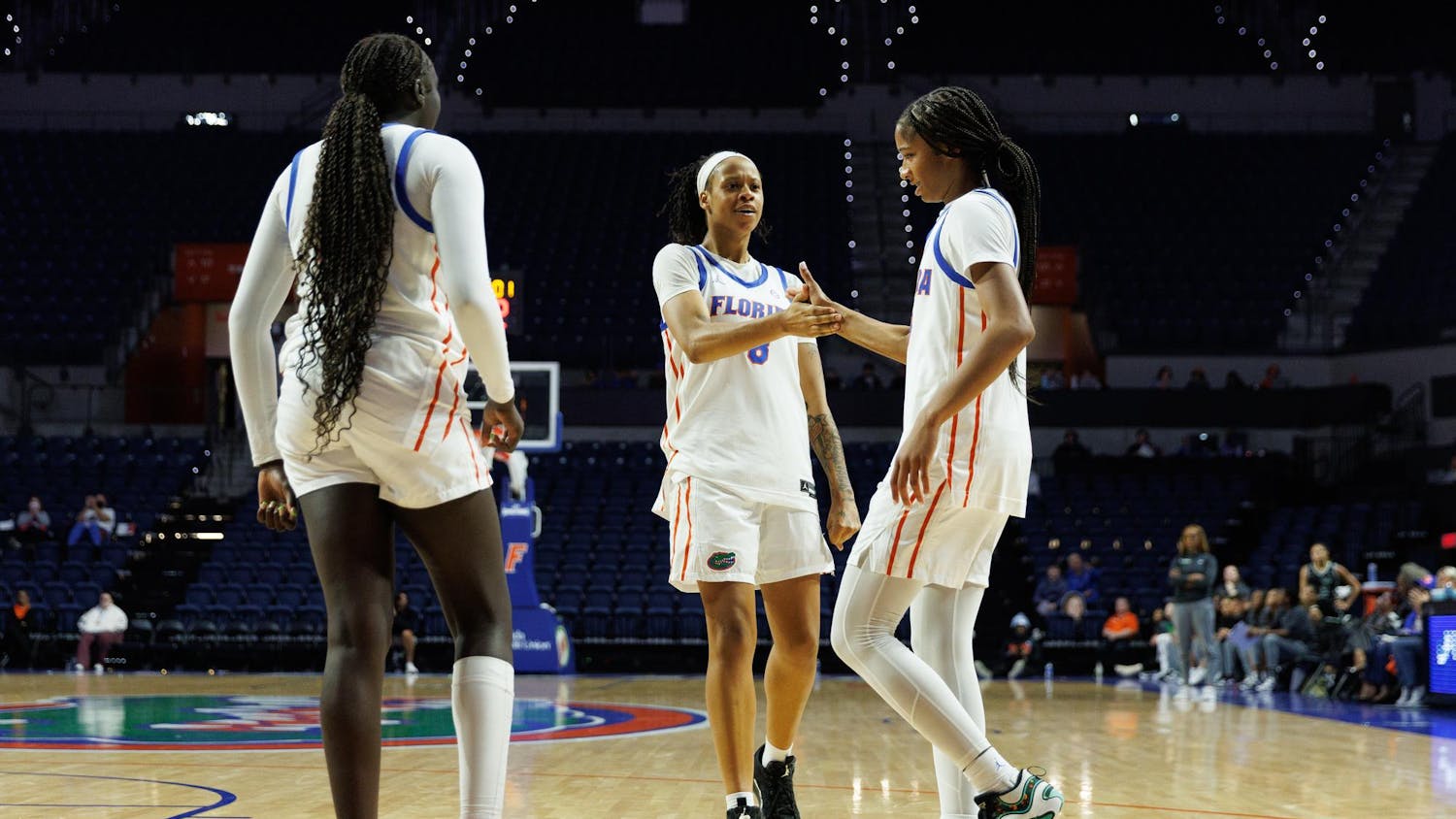The bedrock of America’s criminal justice system is the right to be tried by a jury of one’s peers.
Teen Court, an alternative sentencing program offered by the Alachua County Sheriff’s Office, ensures that even a 13-year-old can face judgment from a jury of their peers in the form of a teenage jury panel.
Every Tuesday evening, about a dozen teens gather in Courtroom 1A at the Alachua County Courthouse to decide the fate of young offenders accused of small crimes. The jury’s goal is to guide its peers toward rehabilitation and positive choices.
“We're literally diverting youth away from the juvenile justice system,” said Olivia Hollier, the Teen Court program coordinator. “There's a big need for this, for kids to be able to stumble and not ruin their lives.”
Most students in the program are facing petty theft, drug possession or battery charges arising from school fights. Teen Court focuses exclusively on determining the most effective punishment to rehabilitate struggling adolescents, so guilt is never an issue.
“When you see that your peers are like, ‘Hey, that's not cool. You shouldn't have done that,’ that hits a little bit harder than an adult being like, ‘Don't do that again,’” Hollier said.
Possible sentences include community service, essays on the importance of good behavior, future service on the Teen Court jury, counseling and open-court apologies to their parents.
“All of our sanctions are centered around bettering the youth, bettering their understanding and taking personal responsibility,” Hollier said. “It's proven statewide, especially in our circuit, it works. It definitely has a positive effect on our youth and not reoffending.”
Before the coronavirus pandemic, Teen Court offered high school students the opportunity to act as a prosecutor or defense attorney under the guidance of experienced lawyers. Prosecutors argue for stern punishments on behalf of the State, while defense attorneys advocate for their teenage clients. The program is attempting to bring back the student-attorney experience after it stopped during the pandemic, Hollier said.
The sentencing decision is ultimately made by each week’s guest judge, who takes into account the jury’s recommendation and sometimes makes slight changes. Any upstanding member of the community can volunteer as a guest judge.
“We've had commissioners, doctors, nurses, lawyers, teachers, deans, principals, sheriffs. All walks of life,” Hollier said. “Sometimes we hear super crazy stories from these people about dumb stuff they did when they were a kid, but that doesn't make it so that your life is over.”
On Feb. 27, Alachua County Judge Susan Miller-Jones presided over three battery cases. Before court, she could be seen asking jurors about their career plans and giving advice on pursuing a college degree. During court, she told defendants to stay out of trouble.
“I feel like that says a lot about our program because even judges in the judicial system support it. It definitely sets some heavier reality into how important this opportunity is,” Hollier said.
In one case Miller-Jones reviewed, a middle-school student was facing criminal charges for a brutal school fight. On the witness stand, he admitted to assaulting a fellow classmate and showed little signs of remorse. Each juror asked at least one question before the student was dismissed for jury deliberations.
At times, deliberations get loud — and heated. The teen jurors argue over the most minute details of a sentence: ‘Should the offender receive 75 community service hours or 100? Should he write a 500-word essay or an 800-word one?’ Sometimes, a gentle reminder of courtroom decorum from the judge helps to resolve differences. Other times, it might take a bathroom break and a breath of fresh air. Regardless, all of them must reach a unanimous verdict.
“This is the kind of thing that I think the average citizen doesn't get the opportunity to see, but it was great to see that today,” Judge Miller-Jones said of the deliberation process. “It's amazing to hear them weigh what we should give for community service and why.”
After the sentence is read aloud, Miller-Jones makes it a point to ask each teen about their life goals and provide advice on how best to achieve them. In between, she delivers a not-so-subtle message about the importance of good choices.
Miller-Jones added one thing to the middle-school student’s final punishment: spending an afternoon listening to cases in an adult criminal courtroom. The goal is to provide a preview of the potential consequences of bad behavior, she said.
Before dismissing the case, there was just one thing left to do — an open-court apology to his guardian. While the student didn’t show remorse on the witness stand, it was a different story when he was ordered by the judge to face his aunt, look her in the eyes and apologize. The emotional exchange even prompted a court clerk to hand out tissues and caused jurors to smile.
“It's good to see them take responsibility and to see that they really acknowledge the effect that it's created on their family,” Miller-Jones said. “There is a different path, and at the end of that path, there can be something great.”
Oryn Yehoshua, a 19-year-old UF statistics and economics freshman, was involved with the Miami-Dade County Teen Court as a student attorney in high school. Yehoshua estimates she’s served as a prosecutor or defense lawyer in over 100 cases, which exposed her to diverse backgrounds.
“I kind of started sympathizing with them. A lot of them come from impoverished backgrounds,” Yehoshua said. “You have to take into account that these are just teenagers who did the wrong thing, and you have to see how they react to that.”
For Yehoshua, the experience was rewarding and transformative. She encourages anyone with a desire to help local youth to get involved with a Teen Court program. Fifty-four Florida counties currently have a program, which can be found on the Florida Association of Teen Court’s website.
“I love it so much. You get a second chance, and you get to see how these people can grow from their mistakes. That's the most important thing at the end of the day,” Yehoshua said.
Contact Daniel Bednar at dbednar@alligator.org. Follow him on X @Danielbednar5.
Daniel Bednar is the City & County Commission reporter and a second-year political science major. He previously worked as the crime reporter. When he's not writing, you can find him driving a motorcycle or flying an airplane.






